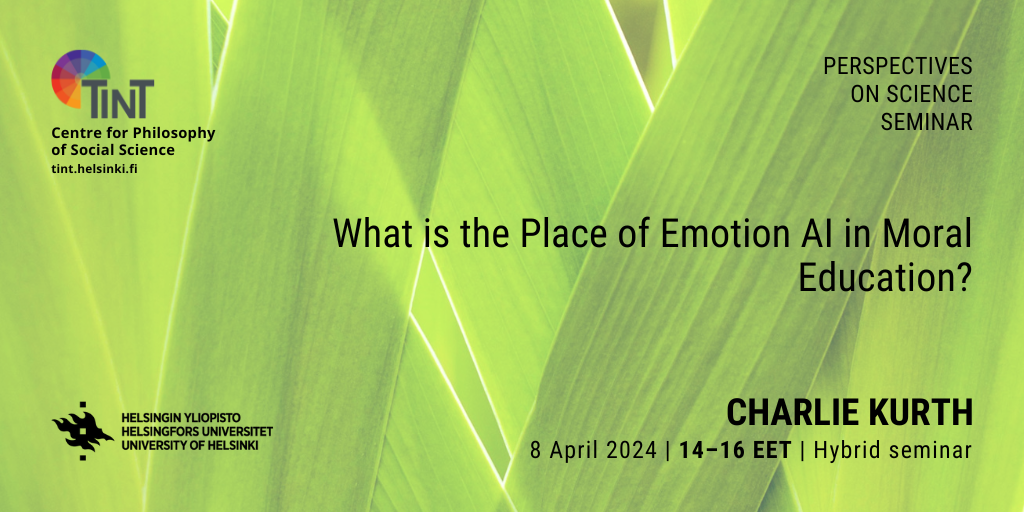
In the next Perspectives on Science seminar, Charlie Kurth (Helsinki Collegium for Advanced Studies; Western Michigan University) will give a talk titled “What is the Place of Emotion AI in Moral Education?”
The seminar takes place in person at Metsätalo and online via Zoom from 14:15 to 15:45 on Monday the 8th of April 2024. To join the seminar, please contact samuli.reijula@helsinki.fi for the location or Zoom invitation.
Perspectives on Science is a research seminar which brings together experts from the philosophy of science and several fields of science studies. It is organized by TINT – Centre for Philosophy of Social Science at the University of Helsinki. More information about the seminar can be found on the TINT web page https://tint.helsinki.fi.
Abstract
Cultivating one’s emotions—learning to feel anger, say, at the right time and in the right way—has long been viewed as central to moral education. Recently, educators, philosophers, and entrepreneurs have pointed to “emotion nudges” and other forms of emotion-focused AI (EAI) as powerful, but under-utilized tools for emotion cultivation. The initial results are intriguing: merely placing “watching-eye” icons in online chatrooms can prompt feelings of anxiety that help curb vicious posting, and virtual reality (VR) simulations can engage stereotype-challenging empathy. But while there’s a growing body of research examining the use of AI for education as well as emotion-focused AI in general, there is little that looks specifically at the science and ethics of using EAI for moral education.
In an effort to start filling this gap, my paper has two aims. First, I identify a trio of issues that must be addressed if EAI is to live up to its promise. More specifically, as it stands, we (i) lack answers to basic questions about how EAI will identify, assess, and educate emotions, (ii) have not considered (much less addressed) very real concerns about how EAI could lead to the deskilling of crucial meta-emotional capacities, and (iii) have done little to tackle problematic political and financial influences that threaten to distort the development of EAI educational tools. While these considerations should leave us very worried about the continued use of EAI, the second part of the paper attempts to find reasons for optimism. To do this, I examine emerging VR technologies in order to explore what scientifically and pedagogically responsible uses of EAI for moral education might look like.
Bio
Charlie Kurth is a Core Fellow at the Helsinki Collegium for Advanced Studies and a Professor in the Philosophy Department at Western Michigan University. His research focuses on issues at the intersection of ethical theory, moral psychology, and the philosophy of emotion; methodologically, he takes philosophical questions about the nature of value and the mind to be productively informed by empirical inquiry in the cognitive and social sciences. Recently, his work has examined the role that emotions play in shaping moral thought and agency.
